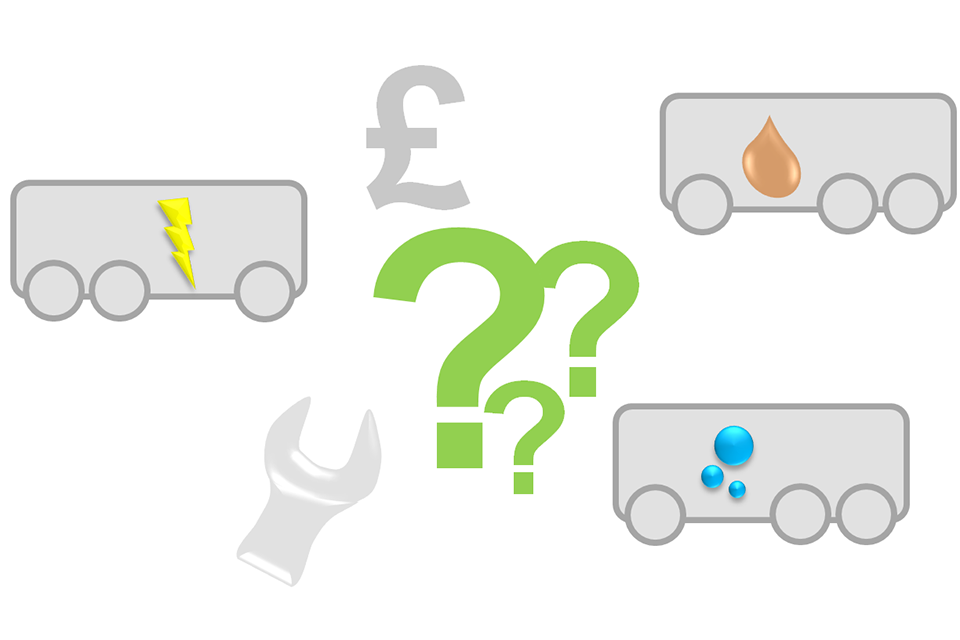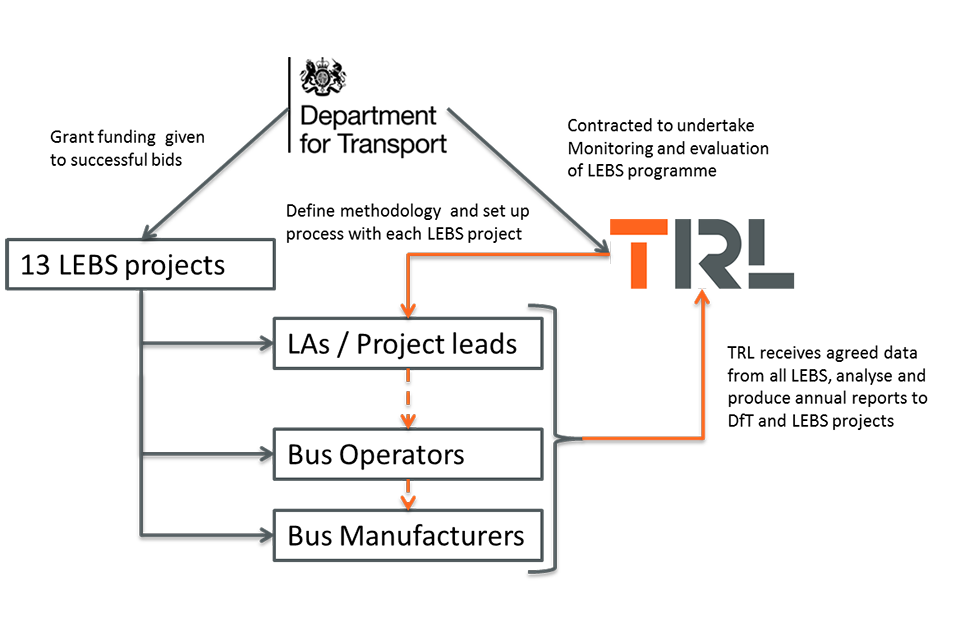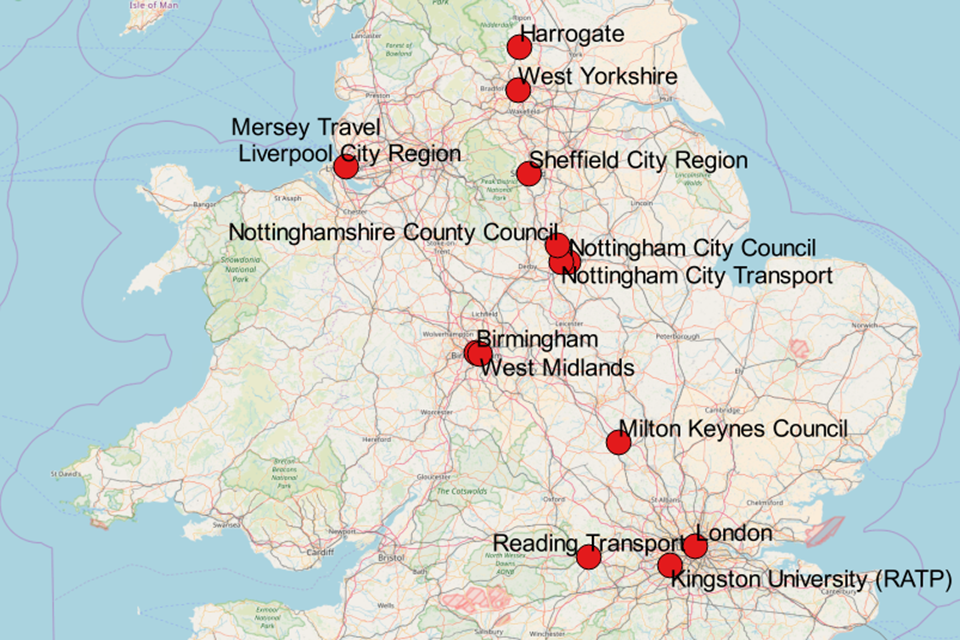Low Emission Bus Scheme performance monitoring
Published 8 October 2018
Introduction
This report provides a brief summary of the LEBS data monitoring project set up as part of the Low Emission Bus Scheme. The report:
- outlines the main goals of the project and how these feed into wider government objectives
- gives an overview of the technologies bid for and the winning bids
Background
The UK government has committed to reducing national CO2 emissions by 80% by 2050 (compared with baseline emissions from 1990). Meeting this target would require almost complete decarbonisation of the transport sector. This target, in combination with local air quality limits continuing to be exceeded in some urban areas, is a motivating factor for the introduction and widespread adoption of low emission buses (LEBs) in the UK.
Diesel technologies have been the predominant powertrain technology for buses for decades. Because of this they are well understood by bus operators, who usually consider fuel costs, reliability, maintenance, capital expenditure, and resale values when specifying vehicles (Figure 1). Bus operators are generally private organisations which have choice in their selection of vehicles – this choice can be steered by advice, subsidy, and regulation.
The purpose of this project is to provide evidence and advice to steer these choices towards bus powertrain technologies which are mutually beneficial for both the operator and the environment, helping to meet government CO2 emission targets and reduce air pollution.
New powertrain technologies offer the potential of significantly lower emissions and lower operating costs. However, there is a lack of real-life experience on factors such as fuel costs and reliability for these technologies, which are so important to bus operators’ vehicle purchasing decisions.
Recent years have seen a large number of LEB technologies, refuelling mechanisms and combinations of these emerge on to the market. However, to date there is no robust, comparable data on the performance, costs and reliability of these different options of LEBs. Without this evidence, it is difficult for the government to make informed policy decisions about which technologies and fuels to support and what might be the most effective methods of supporting these through fiscal or non-fiscal means. Similarly, operators would benefit from such evidence in order to get a better understanding of which LEB technologies would likely be most appropriate for their operations and help to de-risk investment decisions into new vehicles, and infrastructure.

Figure 1 shows some of the primary factors that bus operators take into account when considering purchasing new buses. These include Fuel costs, maintenance, and type of technology.
The Low Emission Bus Scheme
The Department for Transport is providing £30.4 million through the Low Emission Bus Scheme (LEBS), to fund the purchase of 326 buses (and refuelling / recharging infrastructure) across 13 projects in 11 cities across England. The LEBS projects are led by a mixture of bus operators, transport authorities, local authorities and one university.
The scheme encompasses a range of technologies: diesel-hybrid, battery-electric, bio methane and hydrogen Fuel Cell Electric Vehicles (FCEV). LEBS funding is being provided over a period of 3 years, with some projects ordering buses and infrastructure already, and the final batch of orders expected in 2018/19. Vehicles and infrastructure funded in LEBS projects will be owned and operated by bus operators as part of their regular scheduled services.
While these buses and infrastructure are in use, their performance will be monitored for a continuous 12 month period so that their fuel consumption, running costs, reliability and emissions to the environment can be evaluated. Data from in-vehicle monitoring systems, refuelling and charging infrastructure, and other data collected by the operator, will be provided to the research organisation TRL for independent analysis and reporting (Figure 2).
The findings will allow both government and industry to inform:
- government policy on low emission buses
- industry and operator investment decisions
- modelling of LEB impacts in fleet adoption
- providing guidance and advice to support LEB adoption
This project is an example of how the industry, government and research bodies can collaborate to gain a better understanding of new technology developments in transport, and generate evidence on their benefits and impacts.
Results from this data collection process are expected to be released on a quarterly basis to industry with a further in depth analysis to be provided following a full year of data collection.

Figure 2 provides a brief overview of the structure of the project. DfT funded 13 operators who provide monitoring data to research organisation TRL for analysis and reporting.
About the LEBS project
Each of the 13 projects included in the monitoring framework is described below.
Birmingham
The Birmingham project includes LEBS vehicles that will also operate in London. This is a collaborative bid between TfL and Birmingham City Council. Hydrogen Fuel Cell Buses will be procured by both partners, 22 by Birmingham and 20 by TfL. Birmingham will also procure hydrogen refuelling facilities, to be installed at Tyseley Energy Park while TfL will use existing facilities at Lea interchange depot.
Harrogate
This project will introduce 8 electric Volvo single decker buses that will use a combination of pantograph and plug-in charging (manufactured by ABB). A number of local routes will be serviced by these vehicles.
Kingston University (RATP)
This project will introduce 7 Volvo double decker hybrid buses (Volvo B5LH) on routes around the University campus. In total 7 routes will be covered by these buses and buses will be interchangeable between routes. The buses do not require charging infrastructure.
London
Transport for London will introduce up to 34 electric buses across a number of routes in London. Each route would need to be tendered so not all routes or bus manufacturers are known at this stage. So far it is known that 14 electric BYD/ADL single decker buses will be operated by Go Ahead on route 360. The operator for the remaining buses is still to be selected at the time of writing.
Mersey Travel - Liverpool City Region
This project will be introducing a combination of fully electric (12 BYD/ADL single decker), Hybrids (51 Volvo double decker B5LH) and biomethane (9 MAN single decker) buses. The project will also introduce one gas refuelling point and 6 electric chargers. All buses will be operated by Arriva. The gas and hybrid vehicles are already operational.
Milton Keynes Council
This project will introduce 11 Wrightbus single deck electric buses on multiple routes in Milton Keynes. The buses will use a combination of wireless charging and overnight plug-in charging.
Nottingham City Council
This project has received LEBS funding only for charging infrastructure to support an existing fleet of electric buses. No buses were procured as part of the LEBS funding. The infrastructure has already been installed. There is no data available from the charging points installed but it was agreed with the project that it would provide cost data for operating the infrastructure (based on electricity bills) and reliability information.
Nottingham City Transport
This project will introduce up to 53 Scania Double Decker CNG Biomethane buses on multiple routes in Nottingham and corresponding refuelling infrastructure.
Nottinghamshire County Council
This project will be introducing two electric BYD/ADL single deck electric buses to operate on route 510. Two overnight chargers and potentially one other charger will be installed for the project.
Reading Transport
This project will introduce 16 Scania Double Decker CNG Biomethane buses and upgrade an existing refuelling station. All buses will be operated on a single designated route.
Sheffield City Region
This project will introduce 44 Wrightbus double-decker Euro VI hybrid buses on multiple routes. The buses will be operated by Stagecoach and First Group and are expected to enter service initially in January or February 2018 but will then be retrofitted with the hybrid technology by around April 2018.
West Midlands
This project will introduce 19 electric single decker BYD/ADL and 10 Double Decker ADL Hybrid (E400) buses. The buses will be operated by National Express across a number of routes in Birmingham, Wolverhampton and Walsall. Electric buses are not expected to be operational until Q1 of 2019. The Hybrid double decker buses are expected to be delivered in late 2017 and retrofitted to Hybrid in Q1 2018.
West Yorkshire
This project will introduce 8 Wrightbus double-decker hybrid buses across two routes, Elland Road and Temple Green. Buses are expected to be delivered in late 2017 and then retrofitted with the hybrid system in early 2018.

Figure 3: Location of LEBS projects - Mapping © OpenStreetMap contributors, openstreetmap.org
Table 1: LEBS winners
| Bidder | Type of technology | Number of buses | Funding for buses | Funding for infrastructure | Total amount funded |
|---|---|---|---|---|---|
| Birmingham City Council and Transport for London | Hydrogen fuel cell | 42 | £2,814,000 | £1,000,000 | £3,814,000 |
| Kingston University | Hybrid | 7 | £347,400 | £347,400 | |
| Arriva and Merseytravel | Biomethane, Electric, Hybrid | 72 | £4,701,629 | £280,720 | £4,982,349 |
| Milton Keynes Borough Council | Electric | 11 | £1,630,121 | £127,500 | £1,757,621 |
| Nottingham City Council | Electric | £921,154 | £921,154 | ||
| Nottinghamshire County Council | Electric | 2 | £301,900 | £225,000 | £526,900 |
| Nottingham City Transport | Biomethane | 53 | £2,899,763 | £1,533,638 | £4,433,401 |
| Reading Buses | Biomethane | 16 | £63,655 | £1,658,000 | £1,721,655 |
| Sheffield City Region Combined Authority | Hybrid | 44 | £1,320,000 | £1,320,000 | |
| Transdev Blazefield | Electric | 8 | £1,440,000 | £815,700 | £2,255,700 |
| Transport for London | Electric | 34 | £4,584,000 | £416,000 | £5,000,000 |
| West Midlands Travel Limited | Hybrid, Electric | 29 | £2,399,620 | £675,000 | £3,074,620 |
| West Yorkshire Combined Authority | Hybrid | 8 | £234,000 | £234,000 | |
| Totals | 326 | £22,736,088 | £7,652,712 | £30,388,800 |
